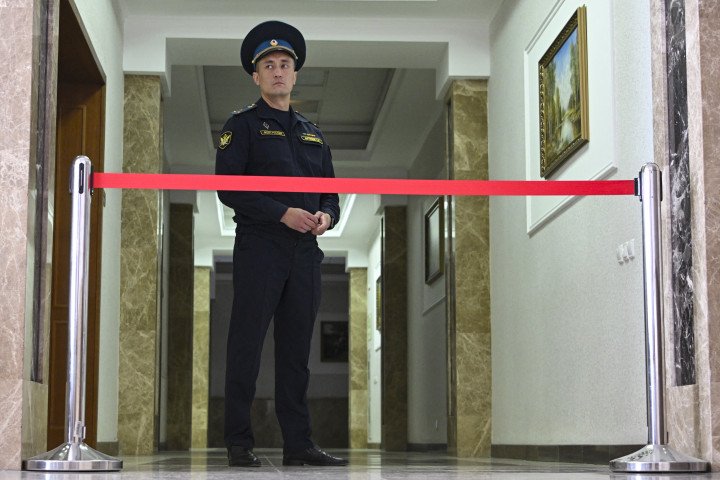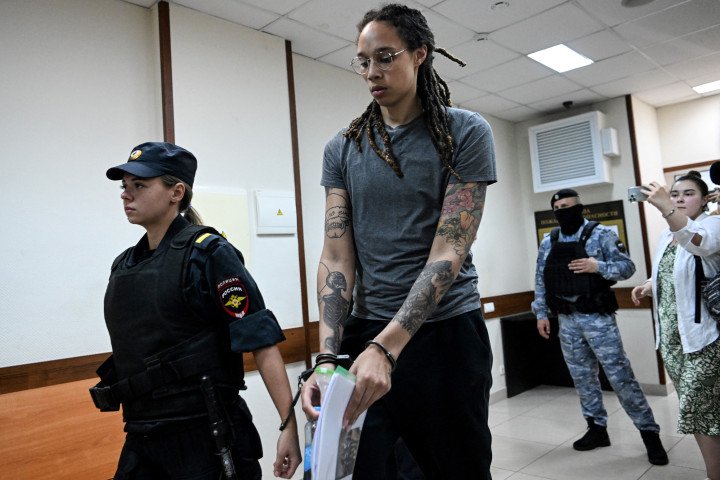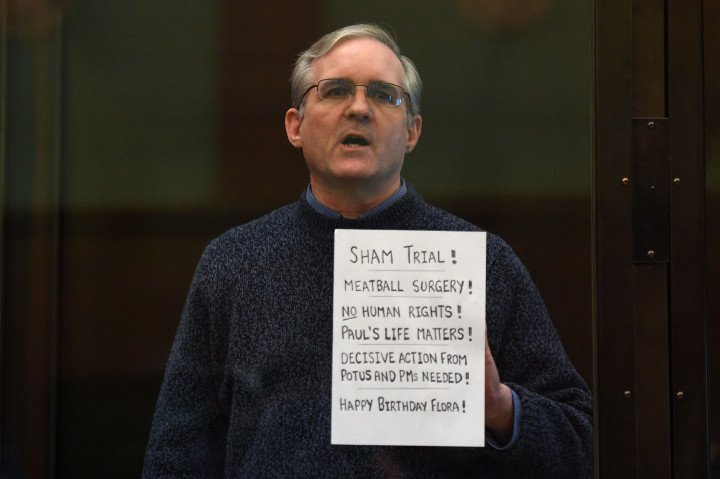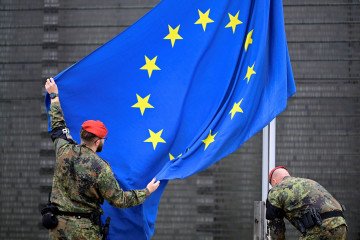- Category
- World
Evan Gershkovich and the Russian Strategy Behind Taking Political Prisoners
-5b055eb4b13471af7a60e42c192fdd3e.jpg)
On July 19th, during a closed-door trial in a Russian court in Yekaterinburg, Evan Gershkovich—the Wall Street Journal reporter—was sentenced to 16 years in prison for espionage. After the court's decision, it’s clear that Gershkovich is another one of Russia’s high-profile political prisoners. This all follows a pattern where in almost all other cases, Russia expects to receive real criminals in exchange for foreign hostages.
Evan Gershkovich’s trial and severe sentencing starkly highlight a growing pattern in Russia: the strategic detention of foreign nationals. The secretive court proceedings, lack of credible evidence, and harsh prison sentences in his case mirror previous incidents involving Paul Whelan and Britney Griner.
Experts believe the harsh sentence, which places Gershkovich in a maximum-security prison, is a calculated move by Russian authorities to use him as a political bargaining chip. US officials view this trial, and others like it, as part of Russia’s broader strategy to detain political prisoners for leverage.

Negotiations with the Kremlin
Discussions of a prisoner swap involving Gershkovich have been occurring for months between the White House and Kremlin. In an interview with Tucker Carlson, Vladimir Putin confirmed the news of the talks, saying “Special services are in talks with one another ''. He was referring to back-channel talks between the Kremlin and the US State Department.
When Carlson straightforwardly asked Putin to hand over Gershkovich to him and his crew as a sign of decency, he kindly denied it but said, "We do not rule out that we can do that, if our partners [the United States] take reciprocal steps”.
Later, Putin hinted at who he might accept in exchange for Gershkovich, mentioning "a person [who] due to patriotic sentiments, eliminated a bandit in one of the European capitals." The individual in question is almost certainly Vadim Krasikov, an FSB colonel currently serving a life sentence for the murder of Zelimkhan Khangoshvili, a former Chechen rebel commander, in broad daylight in a Berlin park in 2019.

Past deals and those still behind bars
This strategy of detaining foreigners on dubious charges has been a recurring narrative in Russia's approach to international diplomacy. By imprisoning foreign nationals on bogus chargers, Russia aims to gain leverage over Western countries, using these detainees as pawns in broader geopolitical negotiations.
Politicized detentions have been used repeatedly, most famously in the case of WNBA star Britney Griner and former marine Paul Whelan. Griner was detained in Russia for a total of 10 months. She was arrested on February 17, 2022, while going through airport security at Sheremetyevo International Airport in Moscow.
Russian authorities found vape cartridges containing less than a gram of hash oil in her luggage. She was subsequently convicted on drug charges and sentenced to nine years in prison. However, she was released on December 8, 2022, as part of a prisoner swap with Russian arms dealer Viktor Bout.
Paul Whelan was convicted on espionage charges similar to Gershkovich, Whelan was detained in Russia on December 28, 2018, while he was in Moscow for a wedding. He was accused of espionage by Russian authorities, charges which he and the U.S. government have denied. Whelan was convicted of espionage and sentenced to 16 years in a Russian penal colony on June 15, 2020.
In 2022, the Biden administration offered a deal that involved Whelan and Griner for Viktor Bout, but talks broke down due to Russia’s insistence on including Vadim Krasikov, the FSB colonel serving a life sentence in Germany. The US Government has a policy against prisoner swaps, citing concerns that they incentivize the detention of Americans as bargaining chips. Families of prisoners, however, argue for swift returns due to concerns for their loved ones' safety.
Whelan has remained in a Russian prison for almost six years now. In 2023, The US State Department designated both Gershkovich and Whelan as wrongfully detained. Reuters reports that at least a dozen American citizens are currently held in Russian prisons, including former soldiers and journalists.

Predetermined outcomes
Russians have a coordinated strategy that they use to collect political prisoners. It involves the manipulation of the Russian judicial system, vague definitions of crimes, and the weaponization of state media.
Russian courts have historically faced scrutiny for their lack of impartiality. According to the Human Rights Foundation, Russian courts are often used by the Kremlin as a tool to target critics and stifle dissent. Evidence suggests that the Russian government exerts considerable control over its judiciary, leading to the conviction of political prisoners regardless of the evidence or fairness of the trial process.
Within Russian law books, the legal definitions of crimes like espionage, extremism, and drug trafficking are intentionally left vague. This allows the government considerable flexibility in the way it can, for example, jail political enemies and see a prosecution through its preordained conclusion.
Within Russian law books, the legal definitions of crimes such as espionage, extremism, and drug trafficking are intentionally vague. This vagueness allows the government considerable flexibility in interpreting and applying these laws, often to target political enemies. For example:
Espionage: Espionage laws in Russia are broadly defined to encompass a wide range of activities that can be construed as threatening national security. This can include gathering information on public policy or economic conditions, which in many other countries would not constitute espionage. These laws can be applied to journalists, activists, and foreign nationals, allowing the government to accuse individuals of spying with minimal evidence
Extremism: The definition of extremism in Russian law includes activities that "incite hatred" or "humiliate the dignity" of a person or group based on various characteristics. However, the criteria for what constitutes incitement or humiliation are not clearly outlined, giving authorities carte blanche to label dissenting speech or opposition activities as extremist. This broad application has been used to target political opponents, NGOs, and even religious groups, effectively stifling dissent and controlling public discourse.
Drug еrafficking: Drug trafficking laws in Russia allow for the prosecution of individuals for possessing even small amounts of controlled substances. The thresholds for what constitutes trafficking versus personal use are low, making it easier for authorities to impose severe penalties. High-profile cases, such as that of Brittney Griner, illustrate the weaponization of security checkpoints in airports, metros, and large for political purposes.
![An electronic billboard at New York's Times Square marks the firstq anniversary of the imprisonment in Russia of Wall Street Journal reporter Evan Gershkovich on March 29th, 2024 (Source: Getty Images) An electronic billboard at New York's Times Square marks the firstq anniversary of the imprisonment in Russia of Wall Street Journal reporter Evan Gershkovich on March 29th, 2024 (Source: Getty Images)]()
An electronic billboard at New York's Times Square marks the firstq anniversary of the imprisonment in Russia of Wall Street Journal reporter Evan Gershkovich on March 29th, 2024 (Source: Getty Images)
“We do not negotiate with terrorists”
For Russia, taking political prisoners is a strong, but simple strategy with many complicated ends. There are many individuals connected to Russian foreign intelligence that are in prisons abroad and it’s the Kremlin’s priority to return them. Through maintaining a roster of high-profile political prisoners, Russia creates political pressure for countries to begin negotiations, in the hopes of returning their assets.
Russia stands to gain a fair deal of influence and political clout, some of the Russian nationals they managed to return are full-fledged war criminals and murderers, who are serving lengthy sentences in Western countries. Their release sets to undermine institutions in the West, while giving Russia legitimacy as a country with global influence.
In a statement released after the sentencing of Evan Gershkovich, President Joe Biden said:
“I have had no higher priority than seeking the release and safe return of Evan, Paul Whelan, and all Americans wrongfully detained and held hostage abroad”.
Highly politicized prisoner exchanges, such as those involving Gershkovich and Whelan, cast political pressure on Russia’s opponents through a series of seemingly calculated moves.“The sham trial and 16-year sentence are stark reminders of the lengths to which tyrants like Putin will go to leverage innocent people as bargaining chips, stifle free speech, and suppress the truth.” - said the Chair of the Senate Foreign Relations Committee Senator Ben Cardin (D-M.)


-27ef304a0bfb28cb4215e5deede4a665.png)
-46f6afa2f66d31ff3df8ea1a8f5524ec.jpg)

-605be766de04ba3d21b67fb76a76786a.jpg)
-2c683d1619a06f3b17d6ca7dd11ad5a1.jpg)

